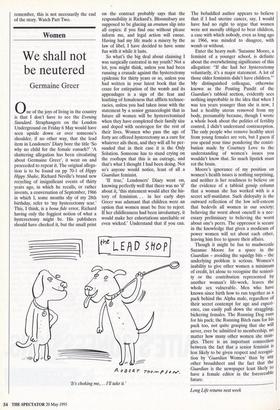Women
We shall not be neutered
Germaine Greer
0 ne of the joys of living in the country is that I don't have to see the Evening Standard. Straphangers on the London Underground on Friday 6 May would have seen upside down or over someone's shoulder, if no other way, that the lead item in Londoners' Diary bore the title 'So why no child for the female eunuch?' A shattering allegation has been circulating about Germaine Greer', it went on and proceeded to repeat it. The original allega- tion is to be found on pp 70-1 of Hippy Hippy Shake, Richard Neville's brand new recycling of insignificant events of thirty years ago, in which he recalls, or rather invents, a conversation of September, 1966 in which I, some months shy of my 28th birthday, refer to 'my hysterectomy scar.' This, I think, is a bona fide error, Richard having only the foggiest notion of what a hysterectomy might be. His publishers should have checked it, but the small print on the contract probably says that the responsibility is Richard's. Bloomsbury are supposed to be glueing an erratum slip into all copies: if you find one without please inform me, and legal action will ensue. Having had my life made a misery by the law of libel, I have decided to have some fun with it while it lasts.
So what's the big deal about claiming I was surgically castrated in my youth? Not a lot, you might think, unless you had been running a crusade against the hysterectomy epidemic for thirty years or so, unless you had written in your latest book that the craze for extirpation of the womb and its appendages is a sign of the fear and loathing of femaleness that afflicts technoc- racies, unless you had taken issue with the statement by a senior gynaecologist that in future all women will be hysterectomised when they have completed their family size and doped with oestrogen for the rest of their lives. Women who pass the age of forty are offered hysterectomy as a cure for whatever ails them, and they will all be per- suaded that in their case it is the Only Solution. Someone has to stand crying on the rooftops that this is an outrage, and that's what I thought I had been doing. Not so's anyone would notice, least of all a Guardian feminist.
`If true,' Londoners' Diary went on, knowing perfectly well that there was no 'if about it, 'this statement would alter the his- tory of feminism. . . in her early days Greer was adamant that children were an option that women must be free to reject. If her childlessness had been involuntary, it would make her exhortations unreliable or even wicked.' Understand that if you can.
`It's choking me,. . . I'll take it.' The befuddled author appears to believe that if I had uterine cancer, say, I would have had no right to argue that women were not morally obliged to bear children, a case with which nobody, even as long ago as 1966, was minded to disagree, with womb or without.
Enter the heavy mob. 'Suzanne Moore, a feminist of a younger school, is definite about the overwhelming significance of this allegation: "If she had her hysterectomy voluntarily, it's a major statement. A lot of those older feminists didn't have children."' My distinguished colleague, otherwise known as the Pouting Pundit of the Guardian's tabloid section, evidently sees nothing improbable in the idea that when I was ten years younger than she is now, I had a healthy uterus removed from my body, presumably because, though I wrote a whole book about the politics of fertility control, I didn't understand contraception. The only people who remove healthy uteri from young females are vets, but I guess if you spend your time pondering the contri- bution made by Courtney Love to the understanding of women's issues you wouldn't know that. So much lipstick must rot the brain.
Moore's ignorance of my position on women's health issues is nothing surprising, and neither is her readiness to believe on the evidence of a tabloid gossip column that a woman she has worked with is a secret self-mutilator. Such disloyalty is the outward reflection of the low self-esteem that bedevils all women in our society; believing the worst about oneself is a nec- essary preliminary to believing the worst about one's peers. The oppressor is secure in the knowledge that given a modicum of power women will set about each other, leaving him free to ignore their affairs.
Though it might be fun to mudwrestle Suzanne Moore for a space in the Guardian — avoiding the squidgy bits — the underlying problem is serious. Women's inability to give other women a minimum of credit, let alone to recognise the seniori- ty or the contribution represented by another woman's life-work, leaves the whole sex vulnerable. Men who have known since birth how to run together as a pack behind the Alpha male, regardless of their secret contempt for age and experi- ence, can easily pull down the straggling, bickering females. The Running Dog runs for his pack; the Running Bitch runs for his pack too, not quite grasping that she will never, ever be admitted to membership, no matter how many other women she man- gles. There is an important connection between the fact that a senior feminist is less likely to be given respect and recogni- tion by 'Guardian Women' than by any other broadsheet and the fact that the Guardian is the newspaper least likely to have a female editor in the foreseeable future.
Long Life returns next week


































































 Previous page
Previous page